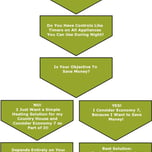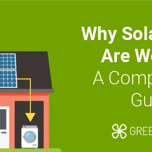Answer these simple questions and we will find you the BEST prices
Which type of solar quotes do you need?
It only takes 30 seconds
100% free with no obligation

Get up to 4 quotes by filling in only 1 quick form

Slash your energy bills by installing solar panels

For the average 2-3 bedroom house
- GreenMatch
- Blog
- Unused Solar Panel Energy
Selling Solar Electricity Back to The Grid: October 2025 Guide

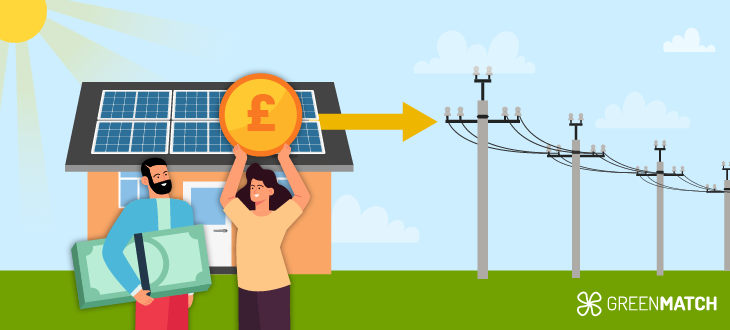
Unsurprisingly, solar panels for homes are becoming increasingly popular to help protect the planet and secure future clean and renewable energy. However, a significant challenge remains: what happens to the excess electricity solar panels produce when it is not utilised? This extra energy is often wasted, resulting in missed opportunities and inefficiencies in using renewable energy.
One solution which homeowners can benefit from is selling power back to the grid. With the aid of innovative solar technology and government payment schemes, solar panels are now more sustainable than ever, as no clean energy goes to waste.
In this article, we will look at how to sell electricity from solar panels in Scotland, Wales, England or Northern Ireland. We will also look at how payments work and how much money you could make sending your excess solar energy back to the grid in the UK.
Solar energy and the potential for unused electricity
The reliance on non-renewable energy sources has become increasingly clear, and finding alternative solutions is key. Solar energy has emerged as a promising option, for renewable energy in the UK and most parts of the world. One of the biggest benefits of solar energy is the excess electricity it generates, which often goes unused.
Photovoltaics have revolutionised the way we generate and consume electricity. Photovoltaic systems are a sustainable alternative to traditional fossil fuels since they use the sun's energy. In just one hour, the amount of sunlight the earth receives is enough to meet the electricity demands of every human being, for a year. However, not all this energy can be collected, and solar panels often generate unused electricity.
One way to address this issue is to store excess electricity in solar batteries for later use. This can be particularly useful for off-grid applications or when there is little sunlight. Another option is to sell electricity back to the grid, which can earn homeowners money through schemes like the Smart Export Guarantee (SEG). This is one of the many advantages of solar energy.
In addition, advancements in technology have improved efficiency and lowered solar panel costs, making solar energy more accessible and cost-effective for consumers. The conversion efficiency of solar photovoltaic systems has enhanced by 0.5% each year for the last ten years, even as production costs have sharply declined.
Governments and private organisations invest in solar farms and infrastructure to capture and distribute solar energy better. Incentives are also available for homeowners and businesses to install solar panels, which can help reduce energy bills and promote a cleaner environment. The potential for unused solar energy is enormous and can help reduce the reliance on non-renewable energy sources.
Solar panels can generate excess electricity during summer. The extra electricity is sent back to the grid, and the homeowner may receive credits from the utility company based on the net kilowatt-hours given to the grid. During winter, the homeowner can draw power from the credits accumulated throughout the summer. If the solar panels generate more electricity than is required, the homeowner can benefit, and sell solar energy to the grid.
What happens to unused electricity generated by solar panels?
Have you ever wondered what happens to the excess electricity solar panels generate? Well, the answer is quite simple. Any excess electricity from the solar panels can be sent back into the grid. This is known as net metering.
There are several options for what to do with the excess energy:
- Store it in batteries: Excess electricity can be stored for later use. This is a great option for off-grid applications or when there is little sunlight.
- Feed it back into the electrical grid: In most grid-connected PV systems, excess electricity is fed directly into the grid network. This is known as net metering, allowing homeowners to earn credits for the excess electricity they generate. These credits can be used to offset future electricity bills. Alternatively, selling electricity back to the grid in the UK is an option through the Smart Export Guarantee.
- Home Power: Excess energy can be used later to power the home using solar battery banks. This is a great option when weather conditions are not optimal for solar energy generation.
- Donate it: Donate the excess electricity to charity. Many organisations accept electricity donations, which would be a great way to help reduce carbon footprint.
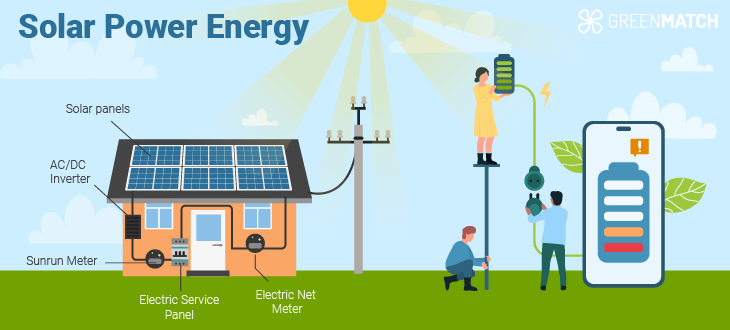
The excess electricity generated by solar panels is not wasted potential. It can be used to power other homes and businesses, reducing the reliance on non-renewable energy sources. There are some challenges associated with solar panels. The required solar panel recycling capacity has to be built as part of a comprehensive end-of-life infrastructure also encompassing uninstallation, transportation, and storage facilities for solar waste.
Additionally, there may be a hiatus when people are expected to give away unused energy for free while waiting to implement a new market. This makes energy firms compete to offer solar homes the best price for any unused energy they export.
How does selling solar electricity back to the grid work in the UK?
As a homeowner with solar panels, you may be able to receive payments for any excess solar energy you send back into the grid. Since 2019, the government have backed various schemes to help those who produce renewable energy, to benefit from sending their surplus into the national energy supply.
The current scheme is the ‘Smart Export Guarantee’, which requires certain energy suppliers to pay a set rate per unit of electricity they receive. How it works is quite straightforward. As long as you are signed up for the scheme, and your solar panels are connected to the national supply, you can choose to either store or sell your excess solar energy.
Once the energy is sent to the grid, the energy supplier will pay a set tariff rate per unit. We recommend you speak to your professional solar installer for any advice in setting this up for your system.
How much can you earn by selling solar power back to the grid?
There is potential to earn between £80 - £170 yearly, if you choose to sell solar back to the grid. However, this amount can vary greatly depending on the size of your system and the tariffs offered by energy suppliers.
This additional income can help reduce your other household bills, and increase the return on your initial solar panel investment, which should boost your yearly finances.
The best way to earn through selling electricity back to the grid in the UK is by using the Smart Export Guarantee scheme.
Smart Export Guarantee explained
Since January 2020, the Smart Export Guarantee scheme has offered small-scale low-carbon energy generates an opportunity to sell solar energy to the grid in the UK. Through this scheme energy suppliers can offer a tariff for the type of renewable energy you export. This can include solar, hydropower, wind power and others.
There are some criteria you must meet to use the scheme, for example, your solar panels cannot exceed a capacity of 5MW (million watts) and must have an MCS certification to prove they were installed by a qualified engineer.
You must also have an export meter, or smart meter, to measure your energy production and send readings to your SEG supplier (known as an SEG licensee). We highly recommend having your circumstances properly assessed to choose the best solar export tariff in the UK.
Selling energy back to the grid can be a quick and easy way to make the most of your solar panels. As long as you understand what criteria and documentation you need, this will be a valuable resource for solar owners to access.
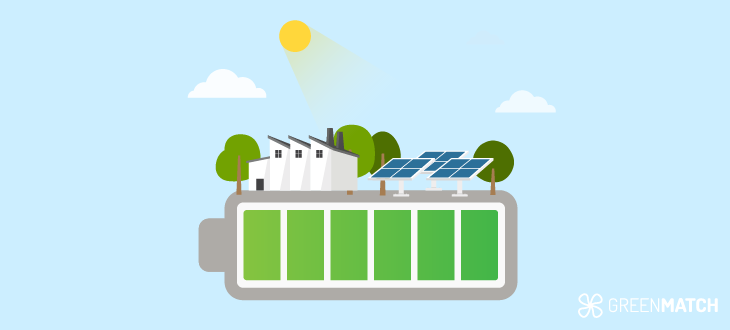
Should you store or sell unused solar electricity?
There are several benefits to storing or selling unused electricity generated by solar panels. These options allow homeowners to make the most of their solar energy systems and earn money through net metering or feed-in tariffs. With technological advancements and the potential for unused electricity, solar energy is becoming an increasingly attractive option for consumers and businesses.
Here are some of the benefits of storing or selling unused electricity generated by solar panels:
Benefits of storing unused electricity
- Cost savings: Storing surplus solar energy in batteries can help reduce electricity bills by allowing homeowners to use stored energy during peak hours when electricity prices are higher.
- Increased energy independence: Storing solar energy in batteries can provide a reliable source of electricity during power outages or when the grid is down.
- Reduced carbon emissions: Storing solar energy can help reduce the need for fossil fuels and decrease carbon emissions.
- Increased efficiency: Storing solar energy can help make the electrical grid more efficient by reducing the need for expensive and inefficient peaker plants.
Benefits of selling unused electricity
- Earn money: Homeowners can earn money by selling back electricity to the grid in the UK through programs like the Smart Export Guarantee (SEG).
- Reduced carbon emissions: Selling excess solar energy back to the grid can help reduce the need for fossil fuels and decrease carbon emissions.
- Increased grid stability: Selling solar back to the grid can help stabilise the electrical grid by providing additional sources of electricity during peak demand.
How to maximise solar panel renewable energy
In today's world, finding sustainable and renewable energy sources is crucial to meet the growing energy demand at homes and businesses. Solar power is a perfect solution; it is clean, affordable, and abundant.
Here are some tips:
- Ensure ample sunlight and a correct installation: Solar panels need to be installed in a location that receives sunlight throughout the day. Ensuring the panels are installed correctly is important to maximise their effectiveness.
- Keep solar panels clean: Solar panels must be clean and free from dirt, debris, and other materials blocking sunlight. Regular cleaning can help maximise solar energy production.
- Install a solar battery: A solar battery can store excess energy generated by solar panels for use during periods of low sunlight or high energy demand.
- Monitor system performance: Regular monitoring of the solar energy system can help identify any issues affecting its performance. This can help ensure that the system is operating at maximum efficiency.
- Pick a solar partner wisely: Choosing a reputable solar panel manufacturer with a proven track record can help ensure that the solar energy system is installed correctly and operates efficiently.
- Having the right system: Before purchasing a solar energy system, it is important to schedule an energy audit to determine the right plan for the home and energy needs.
Utilising solar power is a practical and long-lasting solution for sustainable energy. Optimising solar panel installations and investing in energy storage is the key to maximising its potential. Additionally, adopting energy-efficient practices and exploring new applications can further maximise the use of solar power. Doing so can build a cleaner and more sustainable future for generations.
- Quotes from local engineers
- Payment by finance available
- Save up to £1,567 per year
It only takes 30 seconds



Frequently asked questions
Yes, through net-metering schemes you can sell excess solar energy produced by your solar panels back to the national grid. The Smart Export Guarantee is the current scheme to access these payments.
Yes, there are criteria you must meet to benefit from a net-metering scheme. The SEG requires your solar panels to be under 5MW capacity and have an MSC certificate for installation.
There is no widely set tariff per kWh for solar energy, as tariffs are set by individual suppliers (SEG licensees). The licensee will decide what tariff to offer, which can be fixed or variable. You can find out more about suppliers and their tariffs through Ofgem.
Currently, the only option for homeowners is to sell excess solar energy back to the grid or store it for future use. Laws on this may change in the future.
The amount you can make will vary depending on the energy supplier you sell to. It’s recommended that you shop around to find the best value.

Inemesit is a seasoned content writer with 9 years of experience in B2B and B2C. Her expertise in sustainability and green technologies guides readers towards eco-friendly choices, significantly contributing to the field of renewable energy and environmental sustainability.
We strive to connect our customers with the right product and supplier. Would you like to be part of GreenMatch?

- Quotes from local engineers
- Payment by finance available
- Save up to £1,567 per year
It only takes 30 seconds





